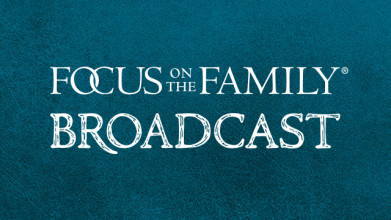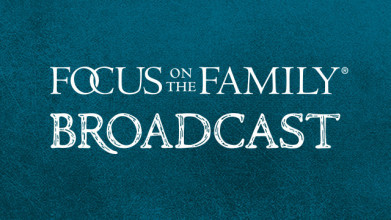Ken Swarner: God so loves my children, and He gave them free will, and He- He’s got them. You know? Our job is to love our kids unconditionally and understand that God’s got the rest of it.
Jim Daly: Hmm.
Ken: And so-
Jim: That’s hard to do sometimes as a parent.
Ken: … I don’t need to change my kids.
Jim: But you’re right.
Ken: God’s there.
Jim: And-
Ken: My job is to just love them, s- because there’s, in this crazy world, and tough world, the kids need somebody who loves them unconditionally.
Jim: Yeah.
Ken: And that’s our job.
John Fuller: That’s Ken Swarner, and he joins us today on Focus on the Family. Your host is Focus president and author, Jim Daly, and I’m John Fuller.
Jim: You know, John, as I look back on my life, uh, man, I have really loved being a dad, um, probably more than anything, and it had challenges, of course, but, man, what great rewards-
John: Hmm.
Jim: … there are in parenting, I think, and, uh, you know, so often, it- it outweighs the difficulties. It’s never perfect. Don’t get me wrong. You’re gonna hit some difficulty, but I really- I just am so grateful the Lord blessed me with children, and a lot of our memories, uh, center around laughter and having fun together-
John: Yeah.
Jim: … I mean, to the point of laughing so hard, milk came out your nose.
John: (laughs)
Jim: You remember that?
John: Yes.
Jim: I mean, we had those moments, and it was so much fun, and today, we wanna share with you some humorous stories about raising children. I’m sure you’ve got your own. Hopefully, we maybe send people to share those stories with us. I hadn’t thought of that.
John: Oh, that’s a great idea. Yeah.
Jim: But, yeah, it might be fun to collect some of the, uh, stories from our listeners and our viewers.
John: Mm-hmm-
Jim: I imagine, uh, you’re gonna pick up on some lighthearted spiritual lessons today as you listen in.
John: Yeah. Ken Swarner has some terrific stories. He’ll be throwing his family under the bus-
Jim: (laughs)
John: … this entire conversation, (laughs) with their permission.
Jim: I can’t wait.
John: Uh, he’s a publisher and a writer and is married to Allison. They have four grown children and four grandchildren, and he’s captured his hilarious stories and insights in a terrific book called, Why Did God Give My Kids Free Will?: He Could Have Waited Until They Moved Out.
Jim: (laughs)
John: That title, alone, uh, tells you where we’re going today. Get a copy of the book when you give us a call, or stop by focusonthefamily.com/broadcast.
Jim: Ken, welcome to Focus on the Family.
Ken: Oh, thank you so much for having me.
Jim: It’s great. We finally found the perfect parent, right?
Ken: (laughs) Yeah, right.
John: Yeah. (laughing)
Jim: That’s the way we like to start this off, but, uh, you kinda got this parenting thing down, don’t you?
Ken: (laughs) No.
Jim: Why are you here?
Ken: I know.
Jim: (laughs)
Ken: Four kids and now four grandchildren and-
Jim: We’re gonna be talking to the producers after the show. No, go ahead.
Ken: (laughs) Yeah, I know. Yeah, four kids and four grandchildren, and I’m still learning lessons-
Jim: Yeah.
Ken: … (laughs) and figuring things out.
Jim: No, that’s good. That’s probably all of us, right?
Ken: Absolutely.
Jim: A lifetime- a lifetime thing.
John: Mm-hmm-
Jim: Hey, your wife had a- a pretty traumatic experience at the pediatrician with your son. What happened?
Ken: So, I-
Jim: Let’s go right there.
Ken: Yeah, this is- this is a good… So, I’m at work-
Jim: (laughs)
Ken: … and my wife calls me, and says that we need to find a new pediatrician, and I’m like, “Well, what? Why- why would that be?” And she said, well, she took our son to- for his annual physical. Now, the thing is, is my wife is a clean freak.
Jim: Okay.
Ken: Right? She has kept us all in line. You know, I say we have four children. She would count me as the fifth child.
John: (laughs)
Ken: And- and so, she’s always on top of everything. She’s like a meerkat. You know? The one time she forgot to check out our son before he went to the doctor is the day they show up and, you know, and they bring you to that little room-
Jim: (laughs)
Ken: … and they tell him, (laughs) you know, “Strip down to your socks and underwear. The doctor will be coming in,” and my wife suddenly realizes, “Oh, my goodness, I didn’t- I didn’t check him.” And so, clearly, he takes his shoes off. His socks look they belonged in a compost bin. (laughing) They were horrible. And so, I said, “Well- well, did they nurse… you know, what- what’d the nurse say?” And she said, “I don’t know. She had her hands over her mouth and nose.” (laughing) Anyway, so, she leaves the room and my wife gets my son up on the, you know, that little sink the doctor washes his hands in-
Jim: Sure.
Ken: … and she’s getting gauze, and she’s wiping and washing his feet, taking the little tongue depressor (laughs) and trying to get the dirt-
Jim: (laughs) Oh gosh.
Ken: … out of his nails.
Jim: This is bad.
Ken: Yeah, yeah, it was horrible. And the doctor walks in and he said, “Don’t worry about it.” He had- he had four boys. He raised four boys. He said, “It’s no big deal. Don’t even worry about it.” And so, I’m like, “Well, then why do we need to get a new pediatrician?” And my wife said, “Because I haven’t gotten to the underwear part yet.”
John: Oh. (laughing)
Jim: Yikes. Let’s not cover that.
Ken: Right. Yeah. (laughing) We’ll end the story there.
Jim: No, that’s, uh, that’s traumatic. I get that, for sure.
Ken: Absolutely.
Jim: You also had a situation, I think, with your daughter when she was little, uh, and I love these moments. These are, uh-
Ken: Love them.
Jim: … throw-you-under-the-bus kind of-thing
John: Yeah.
Jim: … but what happened with your wife?
Ken: So, my daughter was in kindergarten, and it was show-and-tell, and you remember show-and-tell. I mean, for a kindergarten, this is- this is, like, their Oscar moment. Right? They are so excited for show-and-tell, and it was her turn, and she decided, I mean, she went through all the things she wanted to bring, and then decided she wanted to bring her Hula Barbie to show-and-tell. Now, in modern day schooling, now, they- show-and-tell is like a speech 101 class.
John: Hmm.
Ken: So, not only does she have to learn how to- how to, you know, talk about her item, but the kids are all supposed to learn how to ask great questions. So, a kid raises his hand and says, “Well, what do you like best about your Hula Barbie?” My daughter raised the doll up, took the coconut top off of Hula Barbie, pointed to the little plastic bumps and said, “I like these.’
John: Oh. (laughing)
Ken: I happened to be PTA president that year.
John: Oh, my goodness.
Jim: Oh, yeah. Well, you’re in the right spot.
Ken: Yeah.
Jim: Hey, this is what happens with kids.
Ken: Mm-hmm-
Jim: I mean, this is, uh, this is the practical stuff.
John: Hmm.
Jim: I think you als- had… did your wife lose your- one of your kids-
Ken: Oh.
Jim: Like, they walked out the door at a young age.
Ken: Yeah, this is a little more tragic, right?
John: Mm-hmm-
Ken: Um, so, you- you know, you- as parents, you try to stay one step ahead of the kids as they’re developing, and-
Jim: (laughs) At least.
Ken: Yeah, at least, right? And we had a deadbolt on the front door.
Jim: Yeah?
Ken: And my son, who was three, you know, he couldn’t turn that deadbolt, couldn’t even-
Jim: Too high.
Ken: … reach to it. Too high, right.
Jim: Yeah.
Ken: But we just miscalculated that he would… he was at the stage, now, where he knew to drag the chair over.
John: Oh. (laughs)
Jim: Yeah, whoops.
Ken: My wife’s in the back bedroom, folding laundry or something, and he opened it, and opened the door, and my 18-month-old daughter walked right out.
Jim: But he didn’t. He stayed in the house.
Ken: Oh, he stayed in. Yeah.
Jim: That’s pretty funny.
Ken: Oh, you know-
John: Yeah. Releasing the captives.
Ken: Yeah, exactly. Right? (laughing)
Jim: Why don’t you go tell me what’s out there. Bye.
Ken: Yeah.
John: (laughs)
Ken: So, my wife’s sitting there, and all of a sudden, there’s a knock on the door, and she walks out, doesn’t even know our daughter slipped out, and opens the door, and there is a… just the stranger holding our daughter in her hands with the most disappointing look on her face.
Jim: Of course.
John: Hmm.
Ken: Ugh.
Jim: Now, the people listening are going, “I can’t believe that.”
Ken: I know.
Jim: But it happens.
Ken: It does.
John: Hmm.
Ken: In the split of a second.
Jim: And what’s the- so, what’s the- the takeaways of all of these things for you?
Ken: Well, I mean, it’s how to deal with the humiliation of a moment like that, right, how to keep those things in context, how to learn from them, but also how… you know, it plays into all that perfect parenting. Right? We- we believe we’re supposed to be constantly on top of everything, and we’re reminded sometimes that God’s actually the one in control, not us.
John: Mm-hmm.
Jim: So, let me- let me ask you this question. I hadn’t thought about it quite like this. You’re saying humility may be the number one trait you need for parenting?
Ken: Yeah, because humility’s not humiliation. Right? It… there’s a humbleness there. I mean, clearly, our daughter got out. We weren’t… you know, we weren’t protecting her ultimately, and it’s okay to feel humbled by that, but feeling humiliated by that is going into just the wrong direction, and I- I don’t know, I’m not a Biblical scholar, but I don’t believe J- God, Jesus wants us to be humiliated, but certainly humbled.
John: Hmm.
Jim: Yeah, no that’s good. I hadn’t thought about it that way, but, uh, humbleness works in so many aspects of life.
Ken: It does.
Jim: It’s probably the core character we need as human beings, before-
Ken: And parenting.
Jim: … the Lord and before each other.
Ken: Yeah, and parenting brings us to learn all about humbleness.
Jim: (laughs) Yeah.
John: Oh, yes.
Jim: Well, maybe that’s the plan.
Ken: Maybe.
Jim: Maybe that’s why God did that.
John: Oh.
Jim: Selflessness in marriage-
Ken: Right?
Jim: … and humility in parenting.
Ken: That’s right.
Jim: Speaking of that, uh, I love the title of your book, Why Did God Give My Kids Free Will, and I didn’t stop there. I mean, Jean and I read the second half, she started laughing, which goes on to say, He Could Have Waited Until They Moved Out, and I think all parents laugh at that.
Ken: Yeah.
Jim: So, why didn’t He do it that way?
Ken: Yeah, right? It would have been so much easier. At least why did He give my kids free will? I mean, He can give your kids free will-
Jim: (laughs)
Ken: … but why mine? (laughs)
Jim: No, it’s so true, but, uh, you know, you’ve given some examples. Let’s go to a couple of more examples of how free will showed up with your children. I think there’s a slumber party story, there’s chores. I mean, you name it, it sounds like you kept stories on your cr- your kid’s free will.
Ken: I did. Uh-
Jim: (laughs)
Ken: … you know, because I’m always trying to be a better human myself and learn those epiphanies. And so, through humor, I- I can reflect, now, in those moments, all of those moments, right, I’m falling apart. I’m saying, “Why me?” I’m trying to find the ice cream to, you know, to swallow my feelings, but, uh, later, when you have a f- moments to reflect and want to be better, and you- and you go through those instances, you find those epiphanies, and they bring you to humbleness, they bring you to, uh, you know, greater expansion of your patience and greater expansion of your love for God, who keeps our kids safe.
John: Hmm.
Ken: My daughter showing back up on the doorstep with that neighbor, it’s not lost on me how God watches over my family.
Jim: Hmm.
Ken: You know? And there’s such a- a powerful connection there, and- and gratefulness-
John: Mm-hmm-
Ken: … to how the Lord has my back.
Jim: Yeah, totally. Uh, that free will issue, though, uh, you say the dads play a pretty important role in shaping their child’s faith. I think you point to church-going-
Ken: I do.
Jim: … as one of the great, uh, research projects that demonstrate the importance of a father.
Ken: A- absolutely. It- it’s- it’s a fascinating study they did in Switzerland, where they… I don’t have the- the actual percentages memorized, but I know this, that if mom takes her children to church, the dad stays home, those children grow up to say, I think it’s like three or four percent will become li- you know, church-goers as adults.
Jim: Only three or four percent?
Ken: Yeah.
Jim: Wow.
Ken: It’s, like, really, really low, but if mom and dad go to church together and bring the children, it goes up much higher, like, maybe up to 10 or 20 percent, but if only dad takes the kids to church, it’s like 30 percent-
Jim: Hmm.
Ken: … will go to church as adults. What dad does is so impactful, and- and it’s- it’s what dad does, right, not what dad says, what dad does-
Jim: Hmm.
Ken: … the kids take notice of.
Jim: No, that’s really good, and a little convicting that, you know-
Ken: (laughs)
Jim: … that’s the right thing. I think we’ve, as a culture, so undervalued the role of father-
Ken: Absolutely.
Jim: … that we- we’ve kind of lost our way. I’ll stay home and watch football, and instead of getting up and going to the chu- going to church. So, um, let me ask you about this. Uh, before you became a parent, you thought you pretty well knew patience, and we mentioned that a minute ago.
John: Mm-hmm.
Jim: I mean, is that not the thing we gain, being- being-
Ken: (laughs)
Jim: … parents?
Ken: It- it’s shocking. I found it so shocking to find out that-
Jim: (laughs)
Ken: … where I thought my patience was just endless-
Jim: Endless! You’re good at that.
Ken: Yeah, it’s like-
Jim: (laughs)
Ken: … it was so small, in reality.
Jim: Where did that show up in, like, the grocery store situation?
Ken: Oh, it showed up in so many, many-
Jim: (laughs)
Ken: … situa- I mean, every situation, uh, you know, raising children and- and being a good example for them, and- and helping them grow, as Christians-
Jim: Yeah.
Ken: … and, you- you have to- you have to take the time to do that, and there’s so many other distractions and things you gotta do. You gotta clean the gutters, right, and go to work, and all these other things. Even Father’s Day, I- I think of a Father’s Day where I had to be, you know, patient. My kids… you know, I’m up in bed. Right? I can hear them downstairs making a lot of noise, and I- I’m told through my wife that they’re making me Father’s Day breakfast. Right?
Jim: (laughs)
Ken: But it doesn’t sound like (laughs) it’s going well down there.
Jim: Yeah.
Ken: So, they come up. You know, they got the little tray and the- everything’s jiggling-
Jim: Burnt- burnt toast.
Ken: … and first, you gotta be patient-
Jim: (laughing)
Ken: … to make sure… I just see it falling to the floor. But- so, they hand me the- the cereal they’ve made me, right-
Jim: (laughs)
Ken: … and I put my spoon in there, and put it in my mouth, and I look at my son, and I said, “Son, um, is this grapefruit juice in my cereal?”
Jim: (laughs)
Ken: And he said, “Yeah, there wasn’t enough milk for my cereal and yours.”
John: Oh. (laughing)
Ken: And I said, “Well, what was- what was all the noise?” And he said, “Well, I couldn’t open the cereal.” You know that plastic liner-
John: Oh, yeah.
Ken: … inside. It’s, like, with industrial glue.
Jim: Yes, ka-bam.
Ken: So, he finally- he’s pulling and pulling. He finally opens it and all the cereal just goes flying through the kitchen. Right? And he’s telling me he’s trying to scoop it into my bowl before the dog can eat it all up.
Jim: (laughing)
Ken: And I’m looking in the bowl, and there’s, like, a dust bunny in there, and a bread clip.
John: (laughing)
Ken: And I pick up this object and I look at it and go, “Son, what’s this?” And he goes, “Oh, yeah, that’s a Lifesaver.”
Jim: (laughing)
Ken: And he said, “Can you believe all of that was under the refrigerator?” (laughing) And I had to eat it. Now, there’s patience in that. Right?
Jim: Don’t do it. No, you didn’t!
Ken: (laughs)
Jim: Why’d you eat it?
Ken: Well, I took the dust bunny out of the way.
Jim: Okay, I’m like, you’re braver than I am.
John: I wouldn’t have done it. That’s crazy.
Ken: They were so sweet to make it.
John: Yeah. Well, this is Focus on the Family, and Ken Swarner is our guest today, and, uh, what a great insight, uh, he offers us into parenting, the things that we need to learn, the things we will learn from our children and from the Lord, and, uh, we would commend his book to you, Why Did God Give My Kids Free Will?: He Could Have Waited Until They Moved Out. Uh, we’ve got copies of that here at the ministry. Uh, call 800, the letter A, and the word FAMILY or stop by focusonthefamily.com/broadcast.
Jim: Ken, uh, again, some of the great stories in your book. One was about slumber parties, if I remember correctly. Now, Jean and I were pretty hesitant on slumber parties. We were, like, mega careful. I think we may have done only one, and we decided never to do it again. Did you have that same experience?
Ken: Uh, yeah.
Jim: (laughs)
Ken: Like the next time I was gonna have a slumber party, I wanted to send the invitation that it had the words, “All children must be accompanied by an adult-”
Jim: Right.
Ken: … and, “You break, you buy.”
John: Hmm.
Jim: Yes.
Ken: Oh, it’s… ’cause, I mean, talk about patience.
Jim: (laughs)
Ken: I mean, it’s so chaotic. It’s enough with your own kids and the noise they make, and the wild ideas they have about sliding down the stairs on something. Right?
Jim: Right.
Ken: Or whatever else, big ideas they get.
John: Mm-hmm.
Ken: But you bring- you bring six, seven kids together, I don’t care if they’re boys or girls, they start j- it’s- it’s crazy, and, you know, and my wife and I, we’re a good team. You’re know, we’re- we’re always- we’re most of the time on the same sheet of music. You know? But I think sometime during the first one, I think I found my wife hiding in the backseat of the car in the garage. (laughing) You know?
Jim: Why? ‘Cause you came home late.
Ken: Yeah, right?
Jim: You weren’t there.
Ken: I’m knocking on the window, “Honey, you gotta come out-
Jim: Yeah.
Ken: … it’s like Lord of the Flies in there”
Jim: I’m done. (laughing) I’m done with this.
John: Yeah.
Jim: No, that’s, uh, that’s really good. Did you ever do slumber parties?
John: We, just for reasons like, uh, probably you had, we- we avoided them-
Jim: Yeah. (laughs)
John: … at most costs.
Jim: There’s only a downside to slumber parties. (laughs)
Ken: There’s only a-
John: Yeah.
Jim: Only a downside.
Ken: (laughs)
Jim: Uh, I was laughing when I read your story about school supplies. Now, school supplies, this is the bane of my-
John: Ugh.
Jim: … school parenting experienced. They had a pen every year on the school supply sheet that we could never find.
Ken: (laughs)
John: You gotta have it.
Ken: Yeah.
Jim: I mean, we went everywhere, Walmart, Target, you name it, Walgreens, CVS. Nobody had this- this felt, fine point, super fine point pen that you needed to get, and I would spend hours hunting this down. Never found it. Never got a note that we didn’t include it in the kit, and we had to, what, buy 14 boxes of tissues. (laughs) I- I think the school was in a re-sale business-
John: (laughs)
Jim: … on wet-j
Ken: Right?
Jim: … wet wipes and tissues-
Ken: Yeah.
Jim: … ’cause you had to buy, like, cases for them.
Ken: I never understood the tissues either, ’cause my kids use their sleeves.
Jim: Yeah. (laughing)
Ken: What do they need tissues for?
Jim: I’m telling you-
John: Yeah.
Jim: … they were selling them out the back door of the school.
Ken: Exactly.
Jim: That’s how they were getting their lunch money.
Ken: And that pen you’re talking about? It probably costs $27.
Jim: (laughs) Right. The extra fine point.
Ken: (laughs) Yeah.
Jim: I- I often thought I would start a business just pre-packaging this-
Ken: Yeah.
Jim: … and selling them out of my trunk-
Ken: Right?
Jim: … to all the parents. I’ve already done all the work.
Ken: (laughs) Yeah.
Jim: Give me $50 and it’s yours. (laughs) But school supplies were horrible.
Ken: Oh, yeah. My wife stopped even letting me come, because I’d just sit there and complain about every item and what it costs. (laughs) You know, it’s like, “What do they- don’t they just need some crayons?” (laughs)
Jim: You had an experience too, that, I mean, your book is filled with funny stories, which I love, and I think we all can relate to most of them, really.
John: Oh, for sure.
Jim: But you, uh, I think this is teenage time, now, and your son’s gym clothes were (laughing) not coming home regularly. So, uh, is this the same son with the dirty socks and other parts?
Ken: No, well, I have three boys. So-
Jim: Okay.
Ken: … it’s really-
Jim: So, this is a different son.
Ken: … it’s all- it’s all of them.
Jim: I thought-
John: Plug and play.
Jim: This is good to know that the young one may have grown out of it, but his brother, obviously-
Ken: Oh, my, no.
Jim: … you had to go to his gym class and-
Ken: Yeah, some of the stories is, like, you happen to multiple children. I moved it into, you know, one character.
Jim: Okay.
Ken: But, yeah, all of my- all of my boys, you never saw- the gym clothes went, you know, the first day of school, and by about Christmastime, I’m wondering about them.
Jim: (laughs)
Ken: You know? And what is- you know, I- I just imagine the whole-
Jim: This is bad, man. I’m telling you.
Ken: Yeah, right? I’m imagining the whole locker room is some E- EPA super fun site. You know?
Jim: Probably. Haven’t seen those clothes in three months.
Ken: No, an- and- and, you know, back in our day, we had to shower in gym class. Kids don’t do that anymore. So, all I imagine is the clothes are just slipping off their sweaty body, the clothes are sweaty and their bodies are sweaty.
Jim: Yeah.
Ken: Ugh.
Jim: So, what’d you do?
Ken: Uh, well, I went to the s- (laughs) well, one time, I went to the school, went into the office and asked to see the gym clothes. (laughs) It totally humiliated my child. I- I just had to let it go. I, uh, I figured, well-
Jim: Did you gather them up and take them home?
Ken: Yeah.
Jim: The clothes?
Ken: I did the first time, because- because I was… I don’t know.
Jim: Did that solve the problem? Did he bring them home weekly?
Ken: Well, it solved the- no.
Jim: (laughs)
Ken: They didn’t come back home till June.
Jim: (laughs) Oh, jeez.
Ken: So, we had one reset.
John: Hmm.
Jim: That sounds so disgusting. (laughs)
Ken: It is. Well, boys are disgusting.
Jim: I gotta say, I was an orphan kid and I brought my-
Ken: (laughs)
Jim: … I brought my clothes home, ’cause I mean-
Ken: Because back then, the gym teacher made you. Right?
Jim: Well, not only that, but football practice?
Ken: Yeah.
Jim: Man, that thing reeked-
Ken: Oh, yeah.
Jim: … after two or three days.
Ken: Absolutely.
Jim: So, I mean, you know, a little bit of hygiene’s good.
John: Yeah. So, Ken, at that moment, I can picture that there are some moms who are really freaking out-
Ken: Oh, for sure.
John: … and some dads who are saying, “Well, actually, I was just like that.”
Ken: Well, that’s the-
John: How- how important is it for us to keep a filter that says, “Oh, I was once that age and I did stuff too”?
Ken: Yeah. First of all, when I’m complaining about my children like that, I don’t let my mom be in the room at the same time-
Jim: (laughs)
Ken: … because then- then I get to hear all the things I did. Right? Uh, I think that the filter is, you know, we’re- we’re raising adults. Right? We’re not raising children. We’re raising future adults. And so, it’s always the focus is on do you really wanna grow up and offend your (laughs) coworkers? I mean, do you really want to be that smelly person? Do you ever wanna get a date in high school?
John: (laughs)
Ken: You know, which I-
Jim: No.
Ken: (laughing) Yeah.
Jim: I’ve had my boys say, “No, not really.”
Ken: Oh, man.
Jim: What’s your next trick, dad? (laughing) It- it’s true.
Ken: Do you wanna get a job? I don’t know. Okay, then smell. (laughing)
Jim: Which- which is where they’re driving you toward.
Ken: Exactly.
Jim: They want you to give up.
Ken: Or- or do you want me to hose you down in the yard, because I will. (laughs)
Jim: Yeah. Uh, we talked a lot about the boys behavior. You do have a daughter.
Ken: I do.
Jim: So, how did your daughter teach you about trust?
Ken: Yeah, daughters and sons, even- you know, they’re different genders, right, but sometimes, it’s just kids are kids. And so, my daughter is one of those kids who was always very distrusting. Like, her parents really couldn’t handle what was going on, not in any some unsafe way, right, but just… somehow, she came into the world believing that her parents were, you know, just needed to be checked on a little extra carefully. Right? So, she’s always questioning our understanding of what’s going on. So-
Jim: So, she’s the kid that wants to be the parent.
Ken: She’s the kid who wants to be the parent. Exactly.
Jim: Okay, I got it. (laughs)
Ken: Yes, exactly. So, there was a- a time where there was possibility of snow, and my daughter was saying, “Well, there’s not gonna be school tomorrow. Right?” You know there’s… you know, she was doubting the fact that I told her school was happening tomorrow, because you go on the website, right? The school tells you-
Jim: Right.
Ken: … if there’s school tomorrow, and the school was saying, “Yes, they had school tomorrow,” but my daughter didn’t believe it. I was showing her the website, and she still didn’t believe it. So, they get up in the morning. There’s snow on the ground. The website hadn’t been updated. And so, again, she’s saying, “Dad, I just don’t- I just don’t think you know what’s going on.”
Jim: (laughs)
John: Ugh.
Ken: You know, “I just don’t think you know.” And I said, and so, I’m being sarcastic and say, oh, “Yes, I know,” you know, “I know what’s going on.”
Jim: I am your father.
Ken: “I am your father. I, you know, I am older than you. And so, you’re gonna go to school.” And so-
Jim: (laughs)
Ken: … I get them all packed up, and I send them out to the door to the bus stop. (laughs) Five minutes l- no, about 10 minutes later, they come walking back, and I- and my daughter announces, with her hands on her hips, right-
Jim: Of course.
Ken: … all of eight years old-
Jim: Yes.
Ken: … “There is no school today. I told you,” and I said, “Well, how do you know that?” She said, “The lady who lives- lives next to the bus stop told me, and she doesn’t even have kids.” (laughing)
Jim: That’s how pathetic you are.
Ken: Yeah.
Jim: Well, that’s another great example of-
John: Oh, yeah.
Jim: … humility-
Ken: Humility.
Jim: … and what you need-
Ken: That’s right.
Jim: Uh, Ken, as we close out today, uh, you know, there’s the- the parents that have really not allowed patience to be their number one, uh, parental attribute, or humility, and it’s always friction, and you know what happens over time with that friction, is a child’s heart tends to close. And for that parent, what would you say to- to help shake some of that out of them, the exactness-
Ken: Yeah.
Jim: … the behavioral pressure that they’re putting the children under, maybe too much to bear for that age. You never know. But it ends up being so fractured and so, um, disconnected that they’re in the beginning of losing their child, and they don’t even realize it.
Ken: Yeah. I’ve l- I- through the course of four kids, right, this is not how I was when I started, but as I’ve gotten older, I- I think there are two things I’ve learned that have guided me to have great relationships with my adult children, and that’s how I measure it. Right? I mean, that’s how I know it went okay, because I have these relationships. One is show don’t tell. I’m not a fiction writer, but any fiction writer will tell you good writing is showing the story, not telling the story.
Jim: Hmm.
Ken: And what I mean by that is, you can lecture all day long to your children, but it is white noise. They look like they’re listening, but they’re not listening, but what they are doing is watching you, and they can- they- they’re seeing how you live your life.
Jim: Hmm.
Ken: So, if you want children to develop good Christian behaviors and- and be great people, well, then, guess what? You gotta show that, because kids, especially teenagers, they know a hypocrite when they see one.
John: Mm-hmm.
Jim: Yeah.
Ken: And in fact, they’ll call you out. Uh, that has really helped. Second is, the whole free will lesson for me, or what I’ve learned about that is God- God so loves my children, and He gave them free will, and He- He’s got them. You know? Our job is to love our kids unconditionally and understand that God’s got the rest of it.
Jim: Hmm.
Ken: And so-
Jim: That’s hard to do sometimes, as a parent.
Ken: … I don’t need to change my kids.
Jim: But you’re right.
Ken: God’s there.
Jim: And-
Ken: My job is to just love them, s- because there’s, in this crazy world, and tough world, the kids need somebody who loves them unconditionally.
Jim: Yeah.
Ken: And that’s our job.
Jim: I talked about that in a book I wrote called, When- When Parenting Isn’t Perfect. A friend of mine said, “Why’d you use the word when?”
Ken: (laughs)
Jim: You know, parenting isn’t perfect. That as a good point, (laughs) but in that, I use that tetherball analogy that in parenting, you gotta keep the rope attached to the ball. If the ball is your child, and you’re the pole, you know, how do you, through love and through acceptance and through that unconditional love, how do you keep that child tethered to you? And so often, you know, parents are working at- at kinda cutting that rope through their demonstrative demands, rather than understand these are kids. They don’t have adult brains. They don’t have the length of time in a relationship with God.
You gotta love them, and that is gonna be the thing that actually keeps them tethered, in my opinion-
Ken: That’s right.
Jim: … to the pole, to your influence in their life.
Ken: That’s right.
Jim: And, uh, if you sever that, you’re in some deep trouble in that relationship-
Ken: Yeah.
Jim: … and their kids are in deep trouble too.
Ken: That’s right.
Jim: Uh, this has been so good. Man, these are great stories, funny stories.
John: Mm-hmm-
Jim: We’re laughing and-
John: Yeah.
Jim: … uh, I hope you pick up a copy of this great book by Ken, Why Did God Give My Kids Free Will?: He Could Have Waited Until They Moved Out. My emphasis added, of course-
Ken: (laughs)
Jim: … but what a wonderful book, refreshing, full of humor. Ken, you did a really good job with this.
Ken: Thank you so much.
Jim: And, man, as always, we wanna make this available to you. So, get a hold of us. If you can make a gift of any amount, uh, we’ll send it to you as our way of saying thank you for being part of the ministry. It helps if that’s monthly, but a one-time gift is good too. So, also know it’s really important to remember this about Focus. We have 45 years of collecting information, especially on parenting. Uh, that’s the cornerstone of this organization. So, you’re not gonna shock us if you’re going through difficulty or struggle. We have counselors. We have a mound of resources that we’re adding Ken’s to now, uh, to be able to help you through your parenting crisis.
John: Yeah, we’re a phone call away. So, get in touch when you call 800, the letter A, and the word FAMILY, or, uh, find details about, uh, Ken’s book and other resources that we have for you at our website, and that’s focusonthefamily.com/broadcast. On behalf of Jim Daly and the entire team, thanks for joining us today for Focus on the Family. I’m John Fuller inviting you back as we, once again, help you and your family thrive in Christ.




















